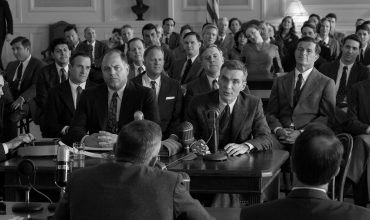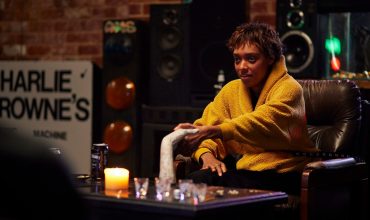It is rare that a film is as simultaneously familiar yet frighteningly disturbing as Birdeater, and the unique combination makes for a disconcerting ride that is not quickly forgotten.
Directors Jack Clark and Jim Weir have created a narrative that echoes an experience that many Australians have experienced – a classic bush trip with mates to celebrate the end of school, a significant birthday, or (in this case) a wedding – but this time with a dark twist. They use the physical trip away from the physical and social confines of the city to explore how toxic masculinity survives and thrives in our modern relationships. Through their use of visual and audio techniques they create an unnerving and visceral psychodrama that is reminiscent of Ted Kotcheff’s Wake in Fright (or the book of the same name) and even literary works like Joseph Conrad’s Heart of Darkness.
The narrative begins with a montage of intimate scenes between the protagonist couple: Irene (Shabana Azeez) and Louie (Mackenzie Fearnley). The soft and dreamy quality of the footage immediately gives their relationship weight and closeness, but the moody sepia tones add a sense of melancholy that foreshadow a darker element at play in their pairing. While it’s never spoken out loud, the way that Irene is almost never pictured out of their shared home is strange, but paired with the way that Louie pressures her to join the bucks party weekend away screams of codependency.
Once at the (again very familiar) shack in the woods, we meet the cast of friends who are each curious and seemingly flawed in their own way. We are driven to the bucks party by the engaged Christian couple Charlie (Jack Bannister) and Grace (Clementine Anderson). As we watch them cruise through the idyllic countryside, Charlie gives Grace instructions on how to act for the weekend and most importantly, how to engage with Irene – red flags galore. We then meet the off the rails Dylan (Ben Hunter) who immediately is aggressive and unnerving. At the house we encounter Murph (Alfie Gledhill) who doesn’t quite seem to fit in with the rest of the group and Sam (Harley Wilson) who seems to only fit in with Irene.
As the party unfurls, so do the gaps in the various relationships. There is the predictable tension between ‘the boys’ and the two girls – the men run wild through the bush, hunting and hollering in an animalistic frenzy while Irene and Grace seem to stick to the sidelines. However as dark descends, and more than just beer is imbibed, more fractures emerge and darker personalities come to the fore. Initially the most dangerous seems to be Dylan – unstable and unforgivable, he doesn’t seem to be able to ‘read the room’ and tries to push Louie to drink more and loosen up. His faux pas culminates in a far too honest speech about Louie’s shortcomings and apparently overtly average-ness. This is at odds with the growing threatening air around him.
Clark and Weir play with jarring audio and haunting lightscapes to create a thick overall tension, and seed doubt about every character’s intentions through deliciously lingering close shots and a sprinkling of juxtaposition to symbolically pit them against each other. While the horror elements are not quite enough to scare in themselves, the psychological implications of the shocking dynamics of Louie and Irene’s relationships should leave the audience unsettled and definitely afraid.
As the night comes to a climax, the behaviour of each character spills out to absurdity and surreal drunken choices. Gritty, messy the directors raise questions about substance abuse, control and masculinity, but with no heroes to ‘save’ the story, there is no satisfying ending, there are no answers, and the audience is left with their hearts in their throats.
Using horror tropes and psychological techniques Birdeater weaves as psychodrama for the new generation and explores the way that toxic masculinity and control can still be present in modern relationships, but might insidiously slip under our radar. It might not reach peak petrifying pitch for die-hard horror fans, but it is an important and unique Australian story that deserves cult fame.
9/10


